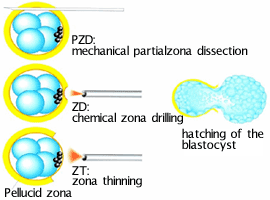
Typical Treatment
– IVF 3
6. Embroyo Transfer or Cryopreserved Egg Transfer
 At the stage when the embryo contains 4-6 cells (2days after egg retrieval), it is then replaced back inside the uterus. In order to increase the chances of successful implantation, the patient is given injections of a hormone called progestin (a synthetic form of the female hormone progesterone). There are two basic methods of returning fertilized eggs to the uterus for implantation. One method is embryo transfer in which the eggs are returned shortly after they have been fertilized and divided 2-3 days after oocyte collection. The second method is where the egg is first fertilized then the resulting embryo is cryopreserved for a period of time at the stage of 4-8 cells before being implanted in the uterus. One case where cryopreservation of embryos might be required is when the ovulation-inducing agent has caused the endometrial layer (lining of the uterus) to become too thin (a side effect of fertility drugs). In this case the embryos would be kept frozen until time that the woman’s uterus naturally develops an endometrial layer that is sufficiently thick enough to support the growth of an implanted embryo. Another common method of embryo transfer is called Blastocyst Transfer. Blastocyst Transfer entails culturing the embryo longer, after fertilization, until the embryo develops for 5 days to the point just before implantation. Generally the more the embryos develop, the higher the implantation rate rises. However this long culture is not always beneficial for all embryos. Note some embryos’ quality decrease during this culture. It’s crucial to determine the timing of embryo transfer, seeing the embryo quality and endometrial condition.
At the stage when the embryo contains 4-6 cells (2days after egg retrieval), it is then replaced back inside the uterus. In order to increase the chances of successful implantation, the patient is given injections of a hormone called progestin (a synthetic form of the female hormone progesterone). There are two basic methods of returning fertilized eggs to the uterus for implantation. One method is embryo transfer in which the eggs are returned shortly after they have been fertilized and divided 2-3 days after oocyte collection. The second method is where the egg is first fertilized then the resulting embryo is cryopreserved for a period of time at the stage of 4-8 cells before being implanted in the uterus. One case where cryopreservation of embryos might be required is when the ovulation-inducing agent has caused the endometrial layer (lining of the uterus) to become too thin (a side effect of fertility drugs). In this case the embryos would be kept frozen until time that the woman’s uterus naturally develops an endometrial layer that is sufficiently thick enough to support the growth of an implanted embryo. Another common method of embryo transfer is called Blastocyst Transfer. Blastocyst Transfer entails culturing the embryo longer, after fertilization, until the embryo develops for 5 days to the point just before implantation. Generally the more the embryos develop, the higher the implantation rate rises. However this long culture is not always beneficial for all embryos. Note some embryos’ quality decrease during this culture. It’s crucial to determine the timing of embryo transfer, seeing the embryo quality and endometrial condition.

Schedule:
AM 8:30~9:00
Call the hospital 2 days after the oocyte pickup and ask for the embryos’ status
- If high-quality embryos, then blast cyst transfer.
- If thin endometrium, then freeze all embryos.
AM11:00~ / PM 2:30~ Embryo transfer
Bed rest for 1~2hours and leave the hospital.
7. Pregnancy Test
Generally 16 days after Egg Retrieval, and normally 14 days after the transfer, we will conduct your first pregnancy test. If pregnancy is confirmed, the remainder of the process is the same for a natural pregnancy.
